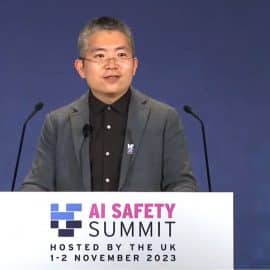


| Personal Brand Presence | 7 / 10 |
| Authoritativeness | 7 / 10 |
| Expertise | 8 / 10 |
| Influence | 7 / 10 |
| Overall Rating | 7 / 10 |
Professor Yi Zeng is the founding director of the International Research Center for AI Ethics and Governance in addition to being the director of the Brain-inspired Cognitive Intelligence Lab at the Institute of Automation, Chinese Academy of Sciences. He is the founding director of the autonomous research institute Center for Long-term Artificial Intelligence. At Tsinghua University’s Institute of AI International Governance, he serves as Chief Scientist for AI Ethics and Governance. In addition, he has a professorship at the Chinese Academy of Sciences University. The National Governance Committee for Next Generation Artificial Intelligence, China, has him on its board. He is an expert in both the WHO Expert Group on AI Ethics and Governance for Healthcare and the UNESCO Ad Hoc Expert Group on AI Ethics. Artificial Intelligence for Sustainable Development, Brain-inspired Artificial Intelligence, Artificial General Intelligence, Ethics and Governance of Artificial Intelligence, and Philosophy are among Yi Zeng’s research interests.
At an AI conference in Shanghai on Friday, the Chinese Academy of Sciences introduced the “Zidongtaichu” 2.0 edition of their next-generation AI model. The database for the new version of the model has grown to include videos, signals, and 3D point clouds, in contrast to its first version, which was primarily fed on traditional data materials like voice, images, and texts. This allows the model to use a wider variety of information and produce more accurate results. After being trained on a sizable amount of data, an algorithm known as an AI model is able to identify patterns and make predictions or judgments.
This model exhibits great promise for use in a variety of industrial settings, including legal consulting, transportation, healthcare, and the scanning and reviewing of videos. When combined with the AI model, the MicroNeuro, a versatile robotic system for minimally invasive neurosurgery, may assist surgeons in making decisions by delivering real-time deductive reasoning based on tactile and visual data.
In the legal services industry, the model may quickly extract important information from court cases to increase productivity, relieve the burden of a shortage of attorneys, and reduce expenses.
Globally, more businesses have entered the market. Many digital behemoths and voice recognition startups have jumped into the creative research and development of this AI technology in China. Since March, iFLYTEK has introduced SparkDesk, Alibaba has introduced Tongyi Qianwen, and Baidu has developed ERNIE Bot.
Solana has demonstrated strong performance, driven by increasing adoption, institutional interest, and key partnerships, while facing potential ...
Know MoreIn April 2025, the crypto space focused on strengthening core infrastructure, with Ethereum preparing for the Pectra ...
Know More